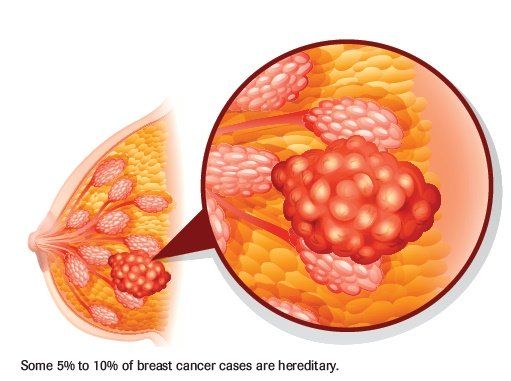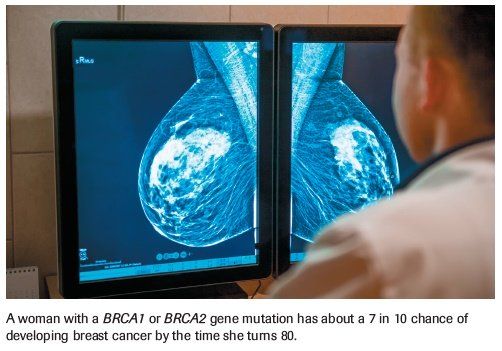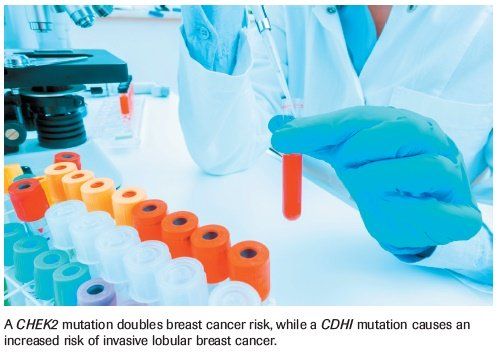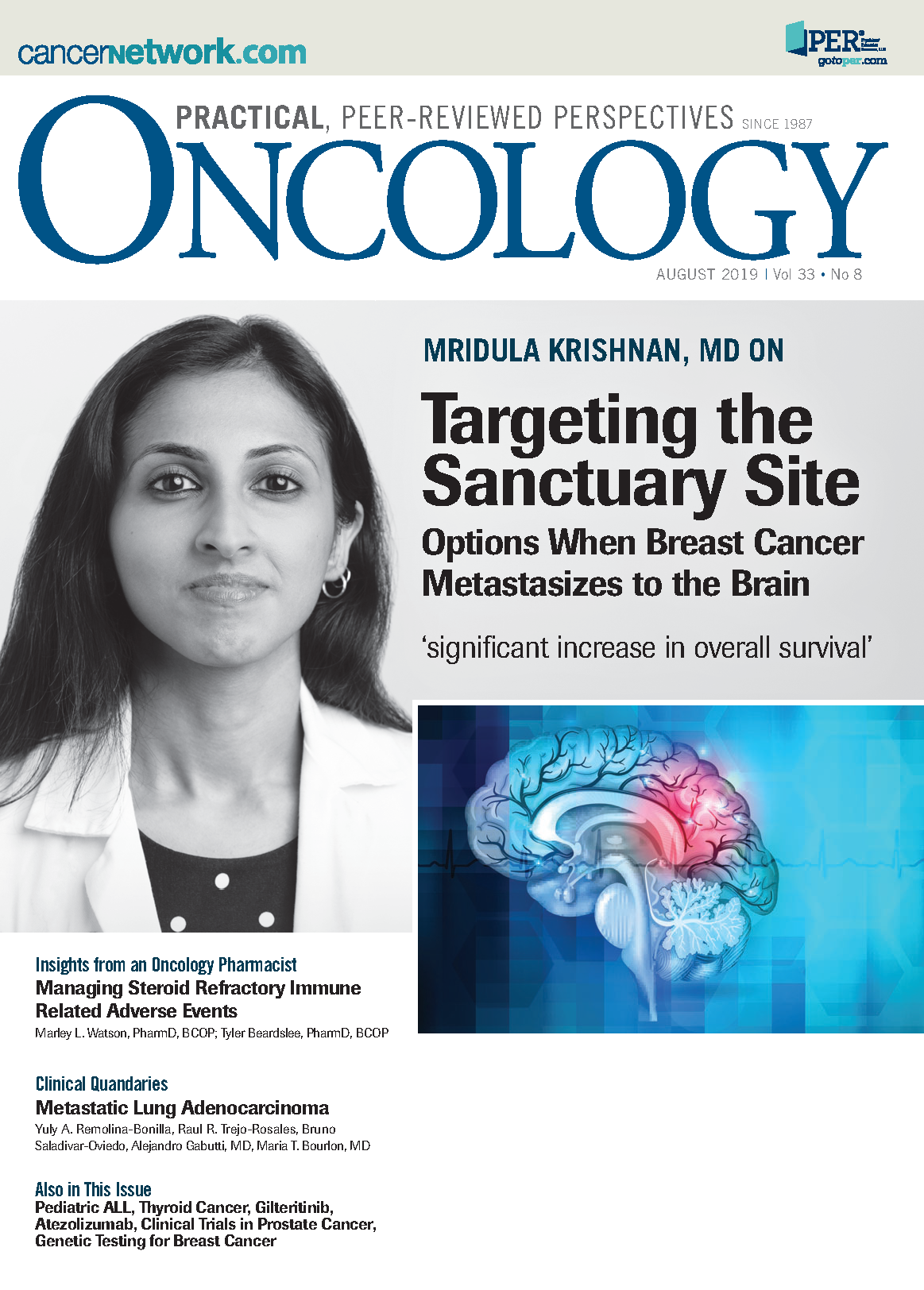Universal Genetic Testing for All Breast Cancer Patients
Accuracy of current guidelines for genetic testing of breast cancer patients has been recently challenged by a pair of studies suggesting that these guidelines may miss as many patients with pathogenic variants (or genetic mutations) as they may catch.



Abstract: Women with pathogenic BRCA1/2 mutations are more likely to develop breast cancer than are women without the mutation and they typically develop cancer at an earlier age. If women are aware of their BRCA1/2 status, however, they can make timely decisions about preventive measures such as chemoprevention with hormonal agents or undergoing prophylactic surgery, all of which have been shown to reduce the risk of cancer and overall mortality. The US Preventive Services Task Force and the National Comprehensive Cancer Network have recommended that women with a family history of breast, ovarian, and certain other cancers consider BRCA1/2 testing. Discovery of additional genes that increase breast cancer risk, coupled with the gradually decreasing cost of performing these tests, has led to the utilization of multigene panels over individual gene testing. Multigene panel testing for hereditary cancer may detect additional mutations that might possibly alter clinical management. Accuracy of current guidelines for genetic testing of breast cancer patients has become a topic of debate due to two studies suggesting these guidelines may miss half the patients with pathogenic variants or genetic mutations. Although the cost of genetic screening has dropped in recent years, there are other costs associated with population screening, including genetic counseling. There is also a lack of evidence in terms of proper procedures and risk management strategies following multigene panel testing, especially when mutations are found in moderate penetrance genes with a high percentage of Variants of Unknown SignificanceVUS and, if a mutation is discovered regarding the most accurate type of medical care. Universal genetic testing in women with newly diagnosed breast cancer has been proposed by some, stirring up strong views on both sides of the issue.
Introduction
Traditionally, healthcare structure has been directed predominantly toward treatment rather than prevention. Advances in genomic medicine offer the opportunity to deliver a new population-based predictive, preventive, personalized, and participatory medicine strategy. Prevention is the key to achieving long-term transformational change and cost effectiveness in cancer care. Approximately 266,120 women are diagnosed with breast cancer every year in the United States.[1] An estimated 5% to 10% of these cancers are likely due to hereditary causes.[2–4] Individuals with a personal or family history of breast cancer may benefit from genetic evaluation to determine their own and family members’ risk for these and associated cancers. Expertise is required to ensure that genetic testing will be performed on an appropriate population of patients, adequately interpreted, and that results are likely to aid in diagnosis or influence management of the patient or family members at risk for hereditary cancer.[5] The complexity involved in risk assessment underscores the importance of genetic counseling both before and after testing. Guidelines from the American College of Medical Genetics and Genomics (ACMG), the National Society of Genetic Counselors, and the National Comprehensive Cancer Network (NCCN) provide detailed criteria for identifying candidates for genetic counseling and possible testing for hereditary breast cancer.[6,7]
Accuracy of current guidelines for genetic testing of breast cancer patients has been recently challenged by a pair of studies suggesting that these guidelines may miss as many patients with pathogenic variants (or genetic mutations) as they may catch. This has led to a call for universal genetic testing in women with newly diagnosed breast cancer, stirring up strong views on both sides of the issue. In one of these two studies, test results from an 80-gene panel in 959 breast cancer patients found no statistically significant difference in the number of pathogenic mutations among breast cancer patients who met the NCCN testing guidelines and those who did not.[8] The other study which involved 4,196 Medicare patients showed that the rate of pathogenic variants for hereditary breast and ovarian cancer patients were similar among patients who qualified for testing under Medicare guidelines and those who did not.[9]
Background
Traditionally, breast cancer prevention has been targeted at high-risk individuals such as BRCA1/BRCA2 mutation carriers. At-risk mutation carriers have been offered MRI and mammography screening, risk-reducing mastectomy, or chemoprevention with hormonal agents.[10,11] Identification of mutation carriers (eg, BRCA1/BRCA2) at high risk of breast cancer has involved genetic testing of affected individuals or those from high-risk families in specialized genetics clinics. Clinical-criteria and family-history–based testing have been only moderately effective at identifying mutations, missing more than 50% of affected carriers.[12] Among the newer moderate-risk breast cancer genes, PALB2 has been shown to grant nonsyndromic quasi-Mendelian susceptibility to disease, for which risk reducing mastectomy or breast MRI has been offered.[13] The mutations of ATM and CHEK2 have lower moderate risks that do not justify risk-reducing mastectomy. Testing for these, though commercially available, is currently not routinely undertaken in clinical practice.[14,15] Manchanda et al addressed the issue of cost effectiveness of a population-based strategy for testing moderate- to high-penetrance ovarian and breast cancer gene mutations in the general population. In their analysis of population –based BRCA1/BRCA2/RAD51C/RAD51D/BRIP1/PALB2 gene testing was more cost effective than any clinical criteria and family history-based strategy. Clinical criteria and family history-based BRCA1/BRCA2/RAD51C/RAD51D/BRIP1/PALB2 testing was also found to be more cost effective than BRCA1/BRCA2 testing alone.[16]
Discovery of additional genes that increase breast cancer risk, coupled with the gradually decreasing cost of these tests, has led to utilization of multigene panel testing over individual gene testing. Multigene panel testing for hereditary cancer may detect additional mutations that might possibly alter clinical management. ACMG and the Association for Molecular Pathology (AMP) recommend categorizing gene variants into five risk levels: pathogenic, likely pathogenic, variant of uncertain significance (VUS), likely benign, and benign. They recommend that VUS should not be used in clinical decision making and, whenever possible, other evidence of disease should be part of a diagnosis.[17] For example, a gene variant deemed “likely pathogenic” might call for additional scans or blood tests to identify specific anomalies. The five categories apply to single-gene diseases like cystic fibrosis and sickle cell disease, but also to cancer risk genes like BRCA1 and BRCA2.
NCCN guidelines recommend germline testing for patients with breast cancer on the basis of age, triple-negative disease, family history, and Ashkenazi Jewish ancestry supported by population-prevalence data.[7] However, research during the past decade has revealed a significant proportion of patients with preventable inherited breast cancer in diverse patient populations. In the United States, fewer than 1 in 5 (an estimated 1.3 million) women with a personal history of breast or ovarian cancer, meeting 2017 NCCN clinical practice criteria for genetic testing, have not been tested for an inherited susceptibility to cancer.[18] The findings of a recent study on multigene panel testing in a total of 959 patients with breast cancer who did and who did not meet NCCN clinical practice guideline criteria reported similar rates (9.39% vs 7.9%, respectively) of pathogenic/likely pathogenic variants along with a very high (54%) percentage of VUS.[8] Another study reported similar rates of pathogenic variants for hereditary breast and ovarian cancer patients who qualified for testing under Medicare guidelines and those who did not.[9]
Should All Patients With Breast Cancer Be Offered Expanded Panel Testing?
The lowered costs of genomic testing with coverage not infrequently available through health insurance may help facilitate expansion of rather restrictive guideline-based criteria. Removing barriers to testing may increase provider discussions and referrals, reducing the barriers associated with testing.[19] Expanding guidelines may improve support for better management of at-risk populations and their reach to cancer genetic services. Ambiguity of results on moderate penetrance genes and VUS may be alleviated by expanded use of multigene panel testing in diverse populations. Wholesale adoption of universal multigene panel testing in all women diagnosed with breast cancer may help identify many more patients harboring pathogenic variants, which is important for the patients and their families.
Universal multigene panel testing in breast cancer, however, has several limitations. Commercially available tests differ significantly on the number of genes analyzed, turnaround time, insurance coverage, and variant reclassification protocols.[20] Such testing may miss genes that could have been detected with a single-gene analysis test.[21] Mutations identified for more than one gene may complicate risk management recommendations.[22] There is lack of evidence regarding proper procedures and risk management strategies following the testing, especially when mutations are found in moderate penetrance genes with a high percentage of VUS.[23] For example, pathogenic variations in BARD1 are associated with a possible increase in breast cancer risk; however, there is no evidence to support enhanced screening, surveillance, or risk reduction measures. Similarly, pathogenic variants in ATM are associated with an increased risk of breast cancer, but there is insufficient evidence to support risk-reducing breast surgery or bilateral salpingo-oophorectomy.[24] To make matters worse, there are documented discrepancies among laboratories, bringing concerns to the quality of these tests. Testing of more genes also leads to increased detection of VUS. These variants present challenges for both patients and medical providers. It becomes even more complicated in racial and ethnic groups in which such variants are both more common and more poorly characterized. Moreover, before ordering these tests, there must be pretest and post-test counseling by a trained professional genetic counselor. There is already a huge shortage of genetic counselors with the demand to supply ratio expected not to reach equilibrium until 2030.[25]
Efforts to Lay the Groundwork for Genetic Screening in Breast Cancer
Recent guidelines put forth jointly by the ACMG and AMP have advanced the field, but the degree of subjectivity allowed by these guidelines can still lead to inconsistent classification across clinical molecular genetic laboratories.[17] Concerted efforts, such as those undertaken by the ClinGen [Clinical Genome Resource] Sequence Variant Inter-Laboratory Discrepancy Resolution Working Group are being made to eliminate unwarranted variation in the characterization and reporting of pathogenic/likely pathogenic variants across laboratories and to harmonize the characterization and reporting of variants.[26] Attempts at data sharing through the ClinVar repository offer a unique opportunity to identify interpretation differences among laboratories by providing open access to variant classifications shared from many clinical laboratories.[27] Clinical laboratories were encouraged to reassess outlier classifications of variants with medically significant differences.[26] These tasks will improve the care of patients with, or at risk for, genetic disorders by providing more consistent variant classifications.[26] Shortage of high-quality genetic counseling on multi-gene panel testing, inequities in access to testing, and the costs of testing to patients and society are being tried to be addressed by using alternative delivery service models such as telemedicine or by training other providers in the field.[28,29]
Conclusion
Universal multigene panel testing of all women who are diagnosed with breast cancer is not ready for prime time. Pathogenic variations in several moderate penetrance genes without established cancer risk reduction guidelines create more questions (and anxiety) than answers. Many health insurance carriers are requiring a genetic counselor visit before approving payment for genetic testing. Not infrequently, this requirement leads to the cancellation of an ordered genetic test. While Medicare covers BRCA1/2 testing, Medicaid coverage for genetic testing varies by state and 15 states did not cover testing as of January 2018.[30] Cost barriers to the receipt of genetic testing and counseling cannot be ignored when considering expanding testing to all patients with breast cancer. The current cost of testing ranges from approximately $300 to $5,000, depending on the extent of genes involved.[31] Given the estimated 266,120 new female breast cancer cases per year in the United States, if all women with breast cancer could undergo genetic testing, total charges would range from a low of $80,000,000 to a high of $1,330,600,000. This estimate does not include the cost of pretest and post-test genetic counseling. The value of ordering universal multigene panel testing of all women who are diagnosed with breast cancer should be balanced against the barriers and ambiguity about the interpretation of these results. Priority should be given to improving the frequency of testing in patients who do meet the criteria, improving the quality of multigene sequencing with better-defined test results, and increasing the availability of genetic counselors.
Financial Disclosure:The author has no significant financial interest in or other relationship with the manufacturer of any product or provider of any service mentioned in this article.
Disclosures:
References:
1. Siegel RL, Miller KD, Jemal A. Cancer statistics, 2018. CA Cancer J Clin. 2018;68:7-30.
2. Risch HA, McLaughlin JR, Cole DE et al. Prevalence and penetrance of germline BRCA1 and BRCA2 mutations in a population series of 649 women with ovarian cancer.
Am J Hum Genet. 2001;68:700-10.
3. Couch FJ, Shimelis H, Hu C, et al. Associations between cancer predisposition testing panel genes and breast cancer. JAMA Oncol. 2017;3:1190-6.
4. Tung N, Lin NU, Kidd J, et al. Frequency of germline mutations in 25 cancer susceptibility genes in a sequential series of patients with breast cancer. J Clin Oncol. 2016;34:1460-8.
5. Robson ME, Bradbury AR, Arun B, et al. American Society of Clinical Oncology policy statement update: genetic and genomic testing for cancer susceptibility. J Clin Oncol. 2015;33:3660-7.
6. Hampel H, Bennett RL, Buchanan A, et al. A practice guideline from the American College of Medical Genetics and Genomics and the National Society of Genetic Counselors: referral indications for cancer predisposition assessment. Genet Med. 2015;17:70-87.
7. NCCN Clinical Practice Guidelines in Oncology (NCCN Guidelines). Genetic/Familial High-risk Assessment: Breast and Ovarian. Version 3.2019. January 18, 2019. https://www.nccn.org/professionals/physician_gls/pdf/genetics_screening.pdf.
8. Beitsch PD, Whitworth PW, Hughes K, et al. Underdiagnoses of hereditary breast cancer: are genetic testing guidelines a tool or an obstacle. J Clin Oncol. 2018;37:453-60.
9. Yang S, Axilbund JE, O’Leary E, et al. Underdiagnosis of hereditary breast and ovarian cancer in Medicare patients: genetic testing criteria miss the mark. Ann Surg Oncol. 2018;25:2925-31.
10. Rebbeck TR, Friebel T, Lynch HT, et al. Bilateral prophylactic mastectomy reduces breast cancer risk in BRCA1 and BRCA2 mutation carriers: the PROSE Study Group. J Clin Oncol. 2004;22:1055-62.
11. Cuzick J, Sestak I, Bonanni B, et al. Selective oestrogen receptor modulators in prevention of breast cancer: an updated meta-analysis of individual participant data. Lancet. 2013;381:1827-34.
12. Kang HH, Williams R, Leary J, et al. Evaluation of models to predict BRCA germline mutations. Br J Cancer. 2006;95:914-20.
13. Antoniou AC, Casadei S, Heikkinen T, et al. Breast-cancer risk in families with mutations in PALB2. N Engl J Med. 2014;371:497-506.
14. Lerner-Ellis J, Khalouei S, Sopik V, Narod SA. Genetic risk assessment and prevention: the role of genetic testing panels in breast cancer. Expert Rev Anticancer Ther. 2015;15:1315-26.
15. National Collaborating Centre for Cancer (UK). Familial breast cancer: Classification and care of people at risk of familial breast cancer and management of breast cancer and related risks in people with a family history of breast cancer. National Institute for Health and Clinical Excellence: Guidance. 2013.
16. Manchanda R, Patel S, Gordeev VS, et al. Cost-effectiveness of population-based BRACA1, BRCA2, RAD51C, RAD51D, BRIP1, PALB2 mutation testing in unselected general population of women. J Natl Cancer Inst. 2018;110:714-25.
17. Richards S, Aziz N, Bale S, et al. Standards and guidelines for the interpretation of sequence variants: a joint consensus recommendation of the American College of Medical Genetics and Genomics and the Association for Molecular Pathology. Genet Med. 2015;17:405-24.
18. Childers CP, Childers KK, Maggard-Gibbons M, Macinko J. National estimates of genetic testing in women with a history of breast or ovarian cancer. J Clin Oncol. 2017;35:3800-06.
19. Whitworth P, Beitsch P, Arnell C, et al. Impact of payer constraints on access to genetic testing. J Oncol Pract. 2017;13:e47-e56.
20. Balmaña J, Digiovanni L, Gaddam P, et al. Conflicting interpretation of genetic variants and cancer risk by commercial laboratories as assessed by the Prospective Registry of Multiplex Testing. J Clin Oncol. 2016;34:4071-78.
21. Hall MJ, Forman AD, Pilarski R, Wiesner G, Giri VN. Gene panel testing for inherited cancer risk. J Natl Compr Canc Netw. 2014;12:1339-46.
22. Walsh T, Lee MK, Casadei S, et al. Detection of inherited mutations for breast and ovarian cancer using genomic capture and massively parallel sequencing. Proc Natl Acad Sci USA. 2010;107:12629-33.
23. Copur MS, Jonglertham P, Zusag T. Should all patients with a diagnosis of breast cancer undergo expanded panel testing? J Clin Oncol. 2019 Jun 27. [Epub ahead of print]
24. Milliron KJ, Griggs JJ. Advances in genetic testing in patients with breast cancer, high-quality decision making, and responsible resource allocation. J Clin Oncol. 2019;37:445-7.
25. Hoskovec JM, Bennett RL, Carey ME, et al. Projecting the supply and demand for certified genetic counselors: a workforce study. J Genet Couns. 2018;27:16-20.
26. Harrison SM, Dolinksy JS, Chen W, et al. Scaling resolution of variant classification differences in ClinVar between 41 clinical laboratories through an outlier approach. Hum Mutat. 2018;39:1641-9.
27. Azzariti DR, Riggs ER, Niehaus A, et al. Points to consider for sharing variant-level information from clinical genetic testing with ClinVar. Cold Spring Harb Mol Case Stud. 2018;4(1):a002345.
28. Schwartz MD, Valdimarsdottir HB, Peshkin BN, et al. Randomized noninferiority trial of telephone versus in-person genetic counseling for hereditary breast and ovarian cancer. J Clin Oncol. 2014;32:618-26.
29. Kinney AY, Steffen LE, Brumbach BH, et al. Randomized noninferiority trial of telephone delivery of BRCA1/2 genetic counseling compared with in-person counseling: 1-year follow-up. J Clin Oncol. 2016;34:2914-24.
30. FORCE-Facing Our Risk of Cancer Empowered. Available at: https://www.facingourrisk.org/understanding-brca-and-hboc/information/finding-health-care/paying_for_testing/basics/medicaid_and_genetic_testing.php. Accessed July 27, 2019.
31. Breastcancer.org. Genetic testing facilities and cost. Available at: https://www.breastcancer.org/symptoms/testing/genetic/facility_cost. Accessed July 27, 2019.
How Supportive Care Methods Can Improve Oncology Outcomes
Experts discussed supportive care and why it should be integrated into standard oncology care.
